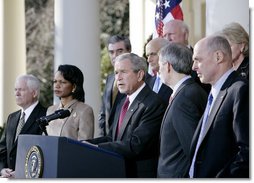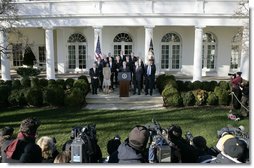
- Afghanistan
- Africa
- Budget Management
- Defense
- Economy
- Education
- Energy
- Environment
- Global Diplomacy
- Health Care
- Homeland Security
- Immigration
- International Trade
- Iraq
- Judicial Nominations
- Middle East
- National Security
- Veterans
|
Home >
News & Policies >
January 2007
|
For Immediate Release
Office of the Press Secretary
January 3, 2007
President Bush Meets with Cabinet, Proposes Balanced Budget and Earmark Reform
Rose Garden
![]() Fact Sheet: A Balanced Budget by 2012 & Earmark Reform
Fact Sheet: A Balanced Budget by 2012 & Earmark Reform
![]() In Focus: Budget Management
In Focus: Budget Management
![]() President Bush's Cabinet
President Bush's Cabinet
10:19 A.M. EST
THE PRESIDENT: Thank you all. We just finished our first Cabinet meeting of 2007. I want to thank my Cabinet officers for joining me here. We discussed our priorities for the next two years, and how we plan to achieve them. The Congress has changed; our obligations to the country haven't changed.
 Tomorrow, members of the 110th Congress will take their oaths of office,
and I congratulate them. I welcome their arrival into town. I'm
looking forward to working with them, and so are members of my Cabinet.
We've all been entrusted with public office at a momentous time in our
nation's history. And together we have important things to do. It's
time to set aside politics and focus on the future.
Tomorrow, members of the 110th Congress will take their oaths of office,
and I congratulate them. I welcome their arrival into town. I'm
looking forward to working with them, and so are members of my Cabinet.
We've all been entrusted with public office at a momentous time in our
nation's history. And together we have important things to do. It's
time to set aside politics and focus on the future.
I've been encouraged by the productive meetings that I've had with many of the new leaders of Congress, people from both parties. I want to thank them for coming down to the White House and talking to me about their ambitions and their goals for our country. I'm hopeful that Republicans and Democrats can find common ground to serve our folks, to do our jobs, to be constructive for our country.
One area where we must work together is that we've got to make sure we spend the people's money wisely. Over the past few years, pro-growth economic policies have generated higher revenues. Together with spending restraint, these policies allowed us to meet our goal of cutting the budget deficit in half three years ahead of schedule. We did so without taxing the working people. We kept taxes low.
It's now time to take the next step. Next month I will submit a five-year budget proposal that will balance the federal budget by 2012. This budget will restrain spending while setting priorities. It will address the most urgent needs of our nation, in particular the need to protect ourselves from radicals and terrorists; the need to win the war on terror; the need to maintain a strong national defense; and the need to keep this economy growing by making tax relief permanent.
By balancing the budget through pro-growth economic policies and spending restraint, we are better positioned to tackle longer-term fiscal challenges facing our country, namely the entitlement programs. These programs need to be reformed for the sake of younger Americans. We need to reform Social Security and Medicare and Medicaid so future generations of Americans can benefit from these vital programs without bankrupting our country.
Another area where we can work together is to reform the earmark process. One important message we all should take from the elections is that people want to end the secretive process by which Washington insiders are able to get billions of dollars directed to projects, many of them pork barrel projects that have never been reviewed or voted on by the Congress.
Some of the earmarks are not even included in legislation. They are stuffed into committee reports that have never been passed, and are never signed into law. Earmarks often divert precious funds from vital priorities like national defense. And each year they cost the taxpayers billions of dollars.
 I appreciate the fact that Senator Byrd and Congressman Obey, the
Democrats who will lead the appropriations process in the new Congress,
heard the same message. For this year's budget, they pledged to
maintain current levels of spending without additional earmarks. They
agreed to a temporary moratorium on all earmarks. And this is a good
start, and I appreciate their position. I also appreciate the fact that
House Republicans last fall passed strong earmark reform idea -- put
forth earmark reform ideas. And I appreciate their hard work.
I appreciate the fact that Senator Byrd and Congressman Obey, the
Democrats who will lead the appropriations process in the new Congress,
heard the same message. For this year's budget, they pledged to
maintain current levels of spending without additional earmarks. They
agreed to a temporary moratorium on all earmarks. And this is a good
start, and I appreciate their position. I also appreciate the fact that
House Republicans last fall passed strong earmark reform idea -- put
forth earmark reform ideas. And I appreciate their hard work.
But we need to do more. Here's my own view to end the "dead of the night" process: Congress needs to adopt real reform that requires full disclosure of the sponsors, the costs, the recipients, and the justifications for every earmark. Congress needs to stop the practice of concealing earmarks in so-called report language. And Congress needs to cut the number and cost of earmarks next year by at least half.
To help rein in wasteful spending and restore fiscal discipline in Washington, I call on Congress to give the President the tool that 43 governors have, a line-item veto.
There are just a few of the issues that we're going to need to work on in the year ahead. This new year brings new opportunities for progress, and I'm looking forward to working with the new Congress.
Thank you for your time.
END 10:25 A.M. EST


